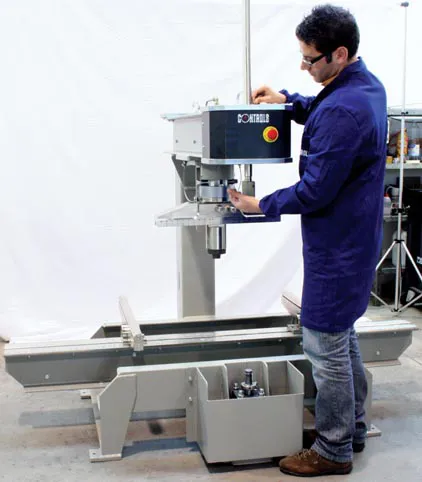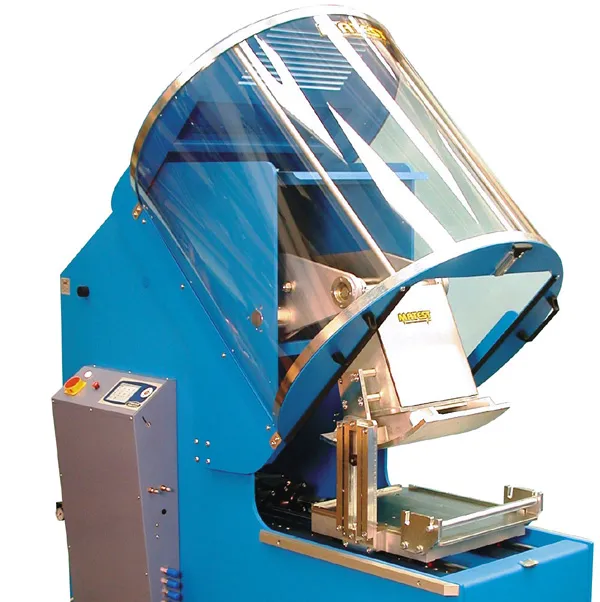
It is just over 50 years since CONTROLS started selling its first testing equipment, beginning with compression machines. Today, it is redeveloping all its compression machines, unveiling two out of a new range of four at this year’s bauma exhibition in March.
“CONTROLS has completely abandoned non-automatic compression machines. Starting from the basic model, we can offer automatic machines at the same or lower price than the non-automatic ones,” said CONTROLS Group general manager Andrea Morotti.
The benefit of fully-automatic machines over semi-automatic ones, explains CONTROLS’ product manager for compression machines Federica Bini, is that they remove the chance of operator error, therefore producing more reliable results.
In rethinking its compression machines, CONTROLS has also come up with ways to offer additional functionality and support. The machines can be linked to digital instruments such as calipers, scales and barcode readers for automatic input of specimen data; they can be accessed remotely for troubleshooting and maintenance; and sharing of test results or even remote viewing is possible via the cloud.
“We put a lot of time into deciding what value we could deliver to the customers with our compression machines, listening to the users, deeply understanding their needs, tailoring our innovative technologies around their desires,” said Morotti.
Family of four
Eventually, the four machines in CONTROLS’ range will be the Wizard Auto, the Pilot Pro, Automax Pro and Automax Pro M. The manufacturer has used existing names, adding the suffixes to them, because they are already well established in the marketplace.
The Wizard Auto is the most basic of the four. This will be used in situations such as on-site testing laboratories, says Bini, to carry out tasks such as checking the strength of concrete cubes. The most advanced will be the Automax Pro M, aimed at universities and modern commercial laboratories. These machines will be able to perform advanced operations such as displacement controlled testing on fibre-reinforced concrete and elastic modulus determination.
All the machines will be scalable and modular so that customers can add additional firmware if they want to add tests. “It’s very modular. We can mix parts and target different levels of cost and price, mixing elements from different models,” said Morotti.
To date, CONTROLS has developed and presented the Wizard Auto and Automax Pro. One of the biggest challenges has been improving the performance while keeping the cost down. It has required significant engineering expertise and development time.
Another challenge has been simplifying the machine interface, making it as much as possible intuitive while increasing the functions and the menus respectively from the traditional machines.
“We have had very positive feedback from users and from dealers regarding the interface,” said Paolo Corbelli, head of electronic design at CONTROLS Group. “It took time and hard work to create a completely new interface which is extremely user-friendly and easy to navigate.”
The human-machine interface including the display menus and the PC software packages represents a large portion of the R&D investment and it keeps CONTROLS ahead of its competitors, said Morotti.
Connected future
With its three new connectivity offers, Link-LAB, WebCare and i-LAB, CONTROLS is starting to explore ways to exploit the Internet of Things and communication between instruments. Link-LAB is the company’s laboratory connectivity package which allows inputs from other devices such as calipers, scales, barcode readers and video cameras, increasing the speed of set up and removing transposing errors.
WebCare will allow CONTROLS engineers to access machines remotely, to investigate problems, carry out routine checks or help with setting up new configurations. It will also allow for upgrades and additions to firmware to be delivered via the internet.
With i-LAB, other laboratories or members of a project team can have access to data which is stored in the cloud. This package also allows remote viewing of tests, almost in real time. Where several parties need to witness a test, this could save on time, air miles and reduce carbon footprints.
Though details have yet to be presented, Morotti suggested that Link-LAB could be purchased on a one-off basis whereas WebCare and i-LAB would be paid for monthly by subscription. Uptake of the three options is likely to vary between regions, he says.
European countries are likely to immediately recognise the benefits of Link-LAB, in Hong Kong and Taiwan, where all tests must be recorded on video, Link-LAB can be used to connect video cameras and remote viewing could prove useful too; in the US, where distances are huge, WebCare would be particularly useful and save time.
Many more options are possible through Industry 4.0 solutions, depending on what CONTROLS’ customers demand and need, said Morotti: “We have tried to think with the customer’s mind to understand where we can create value for a laboratory. Once these services are rolled out, I think we will learn from the users.”









